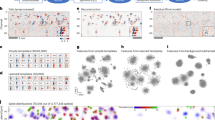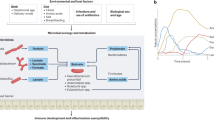Abstract
THE Ouchterlony agar plate technique1 has been used a great deal for the analysis of antibody–antigen systems, but it was not until recently that it was used quantitatively2. An autoradiographic agar plate technique employing radioactive proteins has been described by Perlmann and Hultin3 for the demonstration of proteins in complex systems, but their method was not in any way quantitative.
This is a preview of subscription content, access via your institution
Access options
Subscribe to this journal
Receive 51 print issues and online access
$199.00 per year
only $3.90 per issue
Buy this article
- Purchase on Springer Link
- Instant access to full article PDF
Prices may be subject to local taxes which are calculated during checkout
Similar content being viewed by others
References
Ouchterlony, O., Acta Path. Microbiol. Scand., 25, 186 (1948).
Wright, S. T. C., Nature, 183, 1282 (1959).
Perlmann, P., and Hultin, T., Nature, 182, 1530 (1958).
MeFarlane, A. S., Nature, 182, 53 (1958).
Author information
Authors and Affiliations
Rights and permissions
About this article
Cite this article
RHODES, J. The Ouchterlony Technique using Antigen or Antiserum labelled with Iodine-131. Nature 187, 793–794 (1960). https://doi.org/10.1038/187793a0
Issue Date:
DOI: https://doi.org/10.1038/187793a0
Comments
By submitting a comment you agree to abide by our Terms and Community Guidelines. If you find something abusive or that does not comply with our terms or guidelines please flag it as inappropriate.



